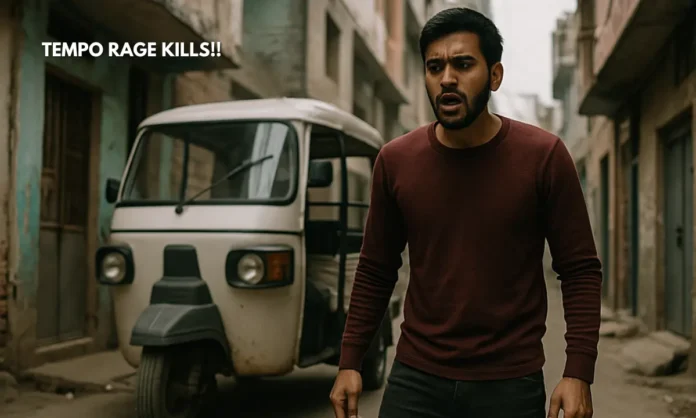Summary
- A 26-year-old man, Deepak, fatally shot his father Surendra Singh in North Delhi’s Timarpur over a dispute about sitting in the front seat of a tempo.
- The victim, a retired CISF sub-inspector, was declared dead on arrival at HRH Hospital; Deepak was arrested at the scene with the weapon and 11 live cartridges.
- The incident unfolded as the family was preparing to relocate to Uttarakhand, exposing deep intergenerational and emotional fractures beneath a trivial argument.
Death Over a Seat: When Family Conflict Turns Fatal in Urban India
In a chilling reminder of how suppressed tensions can erupt into irreversible violence, North Delhi’s Timarpur neighborhood was shaken by a deadly confrontation between a father and son. What began as a seemingly mundane disagreement—who would sit in the front seat of a tempo—culminated in the tragic murder of 60-year-old Surendra Singh, a retired Central Industrial Security Force (CISF) officer, by his 26-year-old son Deepak. The family was preparing to leave Delhi for their native village in Uttarakhand. Instead, they now find themselves at the center of a criminal investigation and a community in shock.
This article probes the deeper undercurrents: the symbolism of control within families, the rising normalization of firearm possession, and how India’s fast-changing urban landscapes often leave mental health and familial breakdowns unattended. With elections, retirements, and relocations intersecting private tempers and public security failures, Timarpur’s tragedy deserves more than a passing headline.
दिल्ली में 26 वर्षीय बेटे ने पिता की गोली मारकर हत्या की
— News24 (@news24tvchannel) June 28, 2025
◆ सीट विवाद में हुई वारदात, आरोपी बेटा गिरफ्तार
◆ मृतक सुरेंद्र सिंह सीआईएसएफ के रिटायर्ड एसआई थे#DelhiCrime | #SonKillsFather | Delhi | #MurderCase pic.twitter.com/AYa8FtKGzx
The Scene in Timarpur: From Farewell to Fatality
- The shooting took place around 7:30 PM near MS Block, Timarpur, in North Delhi.
- Surendra Singh was preparing to relocate after retiring from CISF six months ago.
- Deepak allegedly used his father’s licensed firearm in the shooting.
- A patrolling police team rushed to the site upon hearing the gunshot and arrested Deepak.
- The firearm and 11 live cartridges were recovered at the scene.
According to eyewitnesses and police statements, the sequence of events was alarmingly swift. Surendra Singh, his son Deepak, and other family members had hired a tempo to shift household items to their ancestral village. As they loaded their belongings, a trivial argument turned into a deadly confrontation when Surendra asserted his wish to sit in the front seat. Enraged, Deepak allegedly stormed into their house, retrieved his father’s licensed firearm, returned, and pulled the trigger. The bullet pierced Surendra’s cheek, causing fatal injuries.
Locals sprang into action, subduing Deepak and attempting to wrest the weapon from him until the police arrived. Though Surendra was rushed to HRH Hospital, he was declared dead on arrival.
Beneath the Gunshot: What This Says About Urban Male Volatility
- The accused, Deepak, showed signs of deep-seated anger and entitlement, say sources close to the family.
- Licensed firearms are increasingly misused in domestic settings, reflecting an unmonitored threat.
- The victim’s post-retirement phase was meant to mark a return to familial peace, not rupture.
- The act shows signs of premeditation despite the alleged heat-of-the-moment context.
- Delhi has witnessed an uptick in family-related violent crimes involving firearms.
This was not just an argument about a seat. It was an assertion of dominance, an unchecked emotional spiral, and a fatal misuse of privilege. Deepak, who had access to a licensed weapon meant for security, turned it against the man who had once served to protect others. In a city where aggression often simmers beneath a fragile social order, this case is emblematic of a rising urban pathology: familial conflict as a theatre for asserting agency, often with irreversible consequences.
The growing availability of licensed weapons, combined with impulsive aggression and fractured familial structures, makes for a volatile mix. With rising unemployment, post-pandemic disillusionment, and societal pressure on young men to “man up” economically, the psychological toll is evident. But few are willing to talk about it—until a tragedy strikes.
Firearms, Families, and Failure of Oversight
- Licensed gun ownership does not guarantee emotional restraint.
- Police had to rely on local intervention to prevent further escalation.
- No immediate mental health evaluation was conducted on Deepak.
- The Delhi Police have not clarified how the gun was stored or accessed.
- Public outrage has begun mounting on social media over gun access in homes.
Beyond the obvious horror of a son killing his father lies a policy vacuum. Firearms may be legally licensed, but their storage, usage, and psychological assessment criteria remain largely unmonitored. If a man can retrieve a weapon from his home in a moment of rage, the system has already failed its safeguards.
Moreover, there is little in the way of public discourse on post-retirement familial dynamics, especially when the family patriarch returns from a structured, authoritative profession like the CISF to a domestic space where authority must now be negotiated. In that vacuum, even the smallest triggers—like a seat in a tempo—can become battlegrounds for power and validation.
Closing Reflection: A Seat of Violence
The Timarpur tragedy is more than a father-son argument gone wrong. It’s a manifestation of how familial respect, psychological strain, and systemic oversight collide in modern India. A retired public servant, shot by his own blood, in front of a crowd that watched in horror. A licensed firearm turned into a tool of vengeance. A family’s journey home, interrupted forever.
As Delhi reels from another case of intimate violence, it becomes urgent to ask: How many more reminders do we need before we address gun culture at home, mental health in urban youth, and the deeper costs of emotional neglect? The question is not who got the front seat—but why no one saw the crash coming.


